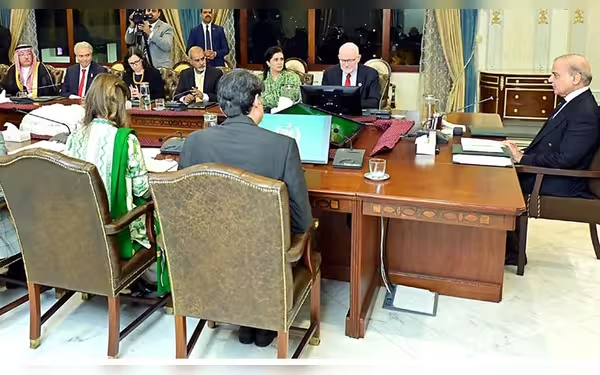Sunday, November 24, 2024 05:28 AM
Shehbaz Sharif's Commitment to Polio Eradication in Pakistan
- Prime Minister reaffirms dedication to polio-free Pakistan.
- International support bolsters anti-polio initiatives.
- Vaccination rates show significant improvement in low-coverage areas.
 Image Credits: dailytimes_pk
Image Credits: dailytimes_pkPrime Minister Shehbaz Sharif reaffirms commitment to eradicate polio in Pakistan, highlighting international support and improved vaccination rates.
Polio, a highly infectious disease that primarily affects children, has been a significant public health challenge in Pakistan for decades. Despite global efforts to eradicate this debilitating illness, the country has faced numerous hurdles, including misinformation, vaccine hesitancy, and security concerns. However, the commitment to eliminate polio remains strong, as evidenced by recent statements from Prime Minister Muhammad Shehbaz Sharif.
On Wednesday, Prime Minister Sharif reaffirmed his government's dedication to achieving a polio-free nation. He highlighted the collaborative efforts of both federal and provincial governments in the ongoing fight against this disease. "The federation, along with all the provinces, is taking active measures for polio eradication," he stated, emphasizing that all provincial governments are on board with the strategy to combat polio.
During a meeting with a high-level delegation from the Polio Oversight Board, which included representatives from prominent global health organizations, the Prime Minister expressed confidence in the coordinated efforts being made. The delegation featured notable figures such as Christopher Elias from the Bill and Melinda Gates Foundation and Dr. Hanan Balkhy from the World Health Organization. Their presence underscored the international support for Pakistan's anti-polio initiatives.
Prime Minister Sharif extended his gratitude to these organizations for their unwavering support. He acknowledged the vital contributions of the King Salman Foundation, Rotary Foundation, UNICEF, and the Centers for Disease Control and Prevention (CDC) in the fight against polio. "These global organizations have played a significant role in our battle against polio," he remarked, expressing optimism that with their continued assistance, Pakistan would overcome this challenge.
The delegation praised Pakistan's commitment and progress in the polio eradication campaign. Representatives from the Bill and Melinda Gates Foundation noted that the country's current anti-polio strategy is being effectively implemented, with positive results beginning to emerge. Dr. Hanan Balkhy emphasized the importance of regional cooperation in addressing public health challenges, urging neighboring countries to engage in dialogue and share resources for a unified approach.
In light of the ongoing challenges posed by polio, the Prime Minister's office confirmed that a third-party audit of the polio eradication drive has been conducted. This audit is part of the government's efforts to evaluate and improve the campaign. Notably, vaccination rates in areas that previously had low coverage have shown significant improvement, indicating that the government's strategies are beginning to bear fruit.
The meeting concluded on a hopeful note, with both the Prime Minister and global partners reaffirming their collective goal to eradicate polio and protect future generations. The commitment to this cause is not just about eliminating a disease; it is about ensuring a healthier future for children across Pakistan.
As the nation moves forward, it is crucial for every citizen to understand the importance of vaccination and to support the efforts being made to eradicate polio. With continued collaboration and determination, Pakistan can aspire to be a polio-free country, safeguarding the health and well-being of its children for generations to come.













